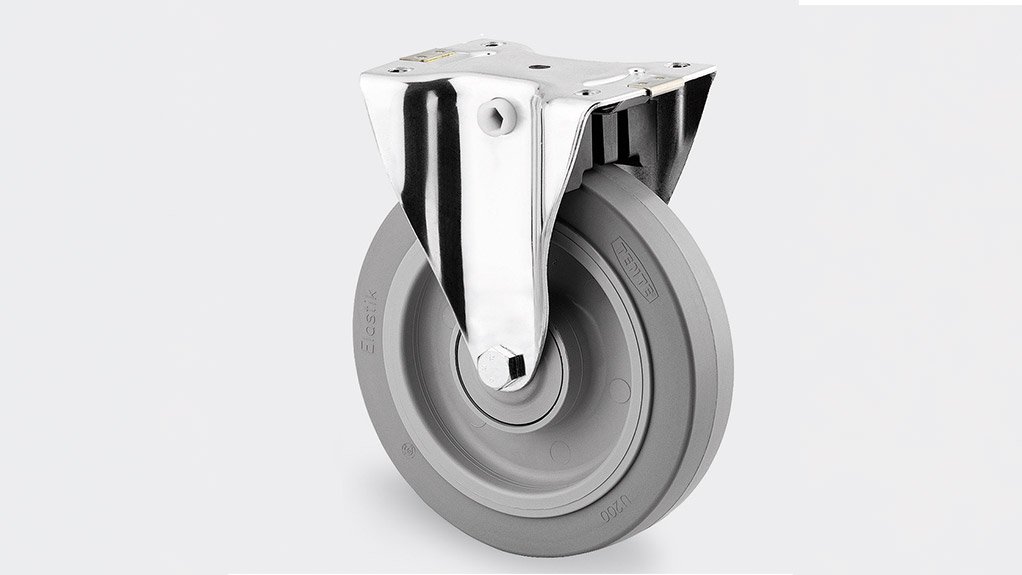New series of stainless steel castors launched


OPERATIONAL LONGEVITY The most prominent benefit of the 8499/ 8470/ 8477/ 8478 series of stainless steel castors is corrosion resistance
Castor manufacturer Tente Castors South Africa introduced its stainless steel 8499/8470/8477/8478 series of stainless steel castors this year, says company technical manager Steve Thomas.
The series comprises swivel, swivel with total lock, fixed and P67 plate central-locking castors, he adds, noting that industry requires castors that provide longevity in operation, smooth and problem-free performance, and environment-friendly attributes through noncorrosive features.
“The high resistance to corrosion, provided by a chromium-rich content of the stainless steel used in the construction of the castors, is the most prominent benefit, while the grade of stainless steel used to make the 8499/8470 series is tougher than commercial-quality hot-rolled steel used on nonstainless steel castors,” Thomas highlights.
In addition, the stainless steel castors also function more effectively in the bakery industry, where temperatures of 280 ºC and aggressive cleaning conditions exist, he says.
The 8499 series includes the 8499UFX160P67 Q1-11 fixed castor with central lock, while the fork is made of stainless steel, Thomas says, adding that the locking system is activated through a cam operated lever or steel cable.
The stainless steel housing can be combined with different wheel bodies and treads, such as a tread made from a thermoplastic rubber called Tenteprene or solid rubber tyres.
The stainless steel castors can also be supplied in an electrically conductive version on request, according to the company’s website.
Thomas further cites the unique features of the Tente P67 plate central-locking system.
“Traditionally, the locking pedal forms part of the castor fork, which rotates. This means that a brake pedal could rotate to a position where it cannot be activated by foot. The P67 plate system has the foot-operated brake in a fixed position; therefore, irrespective of the rotational position of the castor fork, the brake is always accessible,” he explains.
Article Enquiry
Email Article
Save Article
Feedback
To advertise email advertising@creamermedia.co.za or click here
Announcements
What's On
Subscribe to improve your user experience...
Option 1 (equivalent of R125 a month):
Receive a weekly copy of Creamer Media's Engineering News & Mining Weekly magazine
(print copy for those in South Africa and e-magazine for those outside of South Africa)
Receive daily email newsletters
Access to full search results
Access archive of magazine back copies
Access to Projects in Progress
Access to ONE Research Report of your choice in PDF format
Option 2 (equivalent of R375 a month):
All benefits from Option 1
PLUS
Access to Creamer Media's Research Channel Africa for ALL Research Reports, in PDF format, on various industrial and mining sectors
including Electricity; Water; Energy Transition; Hydrogen; Roads, Rail and Ports; Coal; Gold; Platinum; Battery Metals; etc.
Already a subscriber?
Forgotten your password?
Receive weekly copy of Creamer Media's Engineering News & Mining Weekly magazine (print copy for those in South Africa and e-magazine for those outside of South Africa)
➕
Recieve daily email newsletters
➕
Access to full search results
➕
Access archive of magazine back copies
➕
Access to Projects in Progress
➕
Access to ONE Research Report of your choice in PDF format
RESEARCH CHANNEL AFRICA
R4500 (equivalent of R375 a month)
SUBSCRIBEAll benefits from Option 1
➕
Access to Creamer Media's Research Channel Africa for ALL Research Reports on various industrial and mining sectors, in PDF format, including on:
Electricity
➕
Water
➕
Energy Transition
➕
Hydrogen
➕
Roads, Rail and Ports
➕
Coal
➕
Gold
➕
Platinum
➕
Battery Metals
➕
etc.
Receive all benefits from Option 1 or Option 2 delivered to numerous people at your company
➕
Multiple User names and Passwords for simultaneous log-ins
➕
Intranet integration access to all in your organisation


















